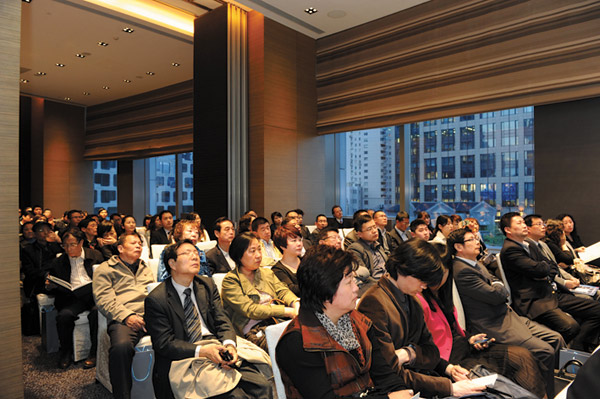Looking abroad for a new home
Updated: 2013-04-08 09:54
By Wang Ying and Hu Yuanyuan (China Daily)
|
||||||||
|
 |
|
An overseas project presentation in Shanghai attracted many potential homebuyers. The Chinese property market is experiencing a new round of tightening. The central government announced on March 1 a levy of a 20 percent tax on gains on pre-owned house sales. [Provided to China Daily] |
Lu Hang, vice-chairman and president of real estate services provider Century 21 China Real Estate, dismissed worries about a trading slump after the imposition of the 20 percent tax on selling a home.
"The 20 percent tax on gains may sound a lot at first but, as a matter of fact, a gains tax for selling a house in the secondary market in the US is more than 20 percent," said Lu.
According to him, in a sophisticated property market, there will be not so many new houses for trading. Therefore, the secondary market will be the main force in buying and selling homes as China's property market develops and matures," said Lu.
It seems there are many choices for investors in buying properties overseas, such as in the US, Australia, Canada, the UK, Europe and Singapore among a myriad of opportunities, but analysts suggest Chinese investors should choose traditional locations and diversify to spread risk.
However, the recent policy adjustment as well as a worsening economic environment might reduce the choice. Canada has suspended all new immigration applications recently, which will hold back many immigration-oriented investors at least over the short term.
Likewise, the increase in stamp duty for foreign investors in Singapore from 13 percent to 18 percent means an increase in investment costs and higher thresholds for foreign investors, in stark contrast with local first time homebuyers' 3 percent stamp tax, according to a China media report.
"Tax, regulations, deductions, property/asset management, procedures and tax rates and breaks can be very different and it is advisable to engage experts such as an accountant, lawyer, estate agent et cetera before buying to ensure you are getting the best deal," said Macdonald.
Local knowledge is also very important. It is best to invest where you or somebody close to you - friends and/or family - knows, he added.
The fallout from the European debt crisis may cool the eagerness of investors wanting to buy property in the continent. Properties in the UK have been hit hard in the crisis with only London staying unscathed. As the traditional European financial center, property values in central London rose 12.9 percent year-on-year in 2012, according to Tian.
It probably cost buyers an average of 20 years to get their investment back from rental incomes in London. The biggest advantage about having a property investment in the UK is that there is no capital gains tax for sales by the non-domiciled, said Yeo.
Properties in Australia are also steady and rising, according to Tian. Even during the most severe time of the last financial crisis in 2008, property values in Australia edged down just 2 percent, while properties in the UK and the US slumped between 20 and 30 percent.

 Li Na on Time cover, makes influential 100 list
Li Na on Time cover, makes influential 100 list
 FBI releases photos of 2 Boston bombings suspects
FBI releases photos of 2 Boston bombings suspects
 World's wackiest hairstyles
World's wackiest hairstyles
 Sandstorms strike Northwest China
Sandstorms strike Northwest China
 Never-seen photos of Madonna on display
Never-seen photos of Madonna on display
 H7N9 outbreak linked to waterfowl migration
H7N9 outbreak linked to waterfowl migration
 Dozens feared dead in Texas plant blast
Dozens feared dead in Texas plant blast
 Venezuelan court rules out manual votes counting
Venezuelan court rules out manual votes counting
Most Viewed
Editor's Picks

|

|

|

|

|

|
Today's Top News
Boston bombing suspect reported cornered on boat
7.0-magnitude quake hits Sichuan
Cross-talk artist helps to spread the word
'Green' awareness levels drop in Beijing
Palace Museum spruces up
First couple on Time's list of most influential
H7N9 flu transmission studied
Trading channels 'need to broaden'
US Weekly

|

|







